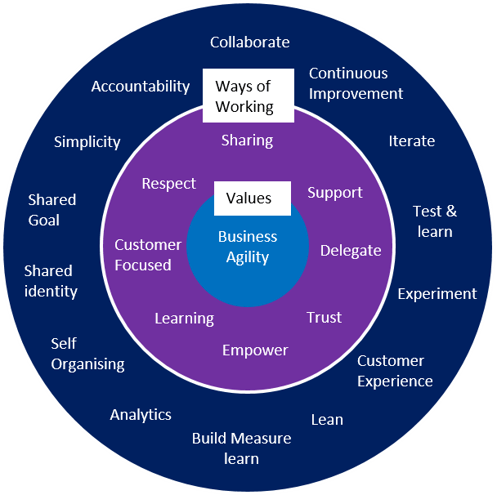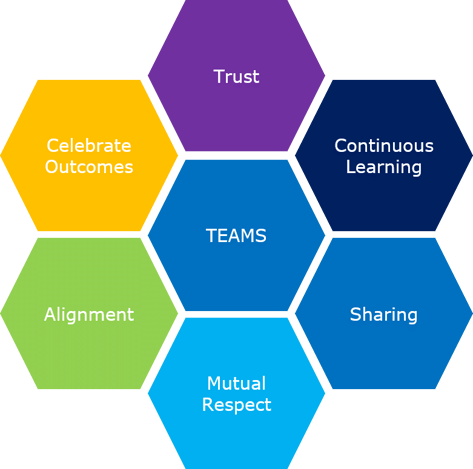Organisations are under immense pressure to accelerate product delivery, manage changing priorities, increase productivity, improve project visibility and enhance software quality. These challenges are leading organisations to adopt new ways of working using Lean and Agile at Scale frameworks in their complex program delivery.
However, it is important for organisations to also focus on transforming the organisational culture. Frameworks on their own will not enable success in an organisations' agile journey, balance is required.
-1.png?width=614&name=Frameworks%20and%20Culture%20(blue2)-1.png)
Scaling agile beyond a single team
Spotify Model, Scaled Agile Framework for Enterprise (SAFe) and Scrum of Scrums are the most popular scaling methods used by 60% of respondents who participated in a Deloitte agile survey.
When scaling agile teams beyond a single team to the portfolio/program or enterprise, it is even more important to have the ‘right’ balance of both agile culture and agile frameworks.
Frameworks can be leveraged as a starting point, but alone they will not enable agility
In the Deloitte Global Human Capital Trends Report, the key people issues identified were employee engagement, culture, time to market and innovation. A remarkable 92% of the organisations surveyed cited ‘redesigning the way we work’ as one of their key challenges to developing the organisation of the future.
In addition, the reason cited why agile evolution has not achieved its strategic objectives is that the organisation’s culture has not changed.

Developing the Organisation of the Future
In order for agile to achieve business benefits, organisations must make it a strategic priority championed by senior leadership.
It is important for organisations to enable strategic change, communication and training plans to create awareness, drive adoption on the new ways of working and develop a lean-agile mindset. Training is an effective way to improve organisation agility, the confidence of teams and team morale.
New ways of working can make a fundamental change across all elements of the organisation to enable how a business creates ideas, plans, executes, makes decisions, learns, manages risk and empowers teams.
Servant Leadership with Tribes
To ensure the effectiveness of agile transformations, the traditional leadership mindset is being shifted to develop a new leadership mindset.
Organisations implementing the Spotify Model have created Tribes. Tribes are made up of many agile teams - squads - with each tribe having a Tribe Leader who is accountable for creating an environment that rewards innovation, learning, experimentation, customer-centric design thinking and valuing contribution instead of your position or hierarchy.
Leading organisations that have implemented agile, such as, Amazon, Netflix and Spotify are striving towards a more flexible, team-centric model and away from the traditional organisational model with hierarchical job levels based on expertise in a specific area.
Our research into enterprise agility in Australia and working with several large organisations on their enterprise agility journey has found that the level of maturity and success of enterprise agility correlates to the level of involvement from senior leadership.
Therefore, it is imperative that senior leadership are at the heart of the organisational design due to their impact and influence that is needed to shape the people, processes, technology and structure of the organisation to achieve the vision.
Tribe Leaders need to be key enablers of the agile transformation to support agile squads and provide a commitment to address impediments. They play a pivotal role as servant leaders to the squads.
Organisations are required to delegate decision making to squads so that those teams are productive. Squads need to have autonomy and will work the way its members choose to work. Highly empowered, trusted and engaged squads are able to resolve issues collectively and develop a solution-focused mindset.
There are approaches such as Delegation Poker, which are effective exercises for agile leaders to clarify and define accountability with their squads.
Effective leaders must be present, responsive and create an environment that fosters innovation. This could mean spending time co-located with the squads, walking the wall, coaching and mentoring.
Collaborating as One Team in Squads
In agile organisations, members of squads support each other and collaborate to achieve objectives and goals. Agile practices are most effective when there is a one-team culture with a shared purpose and vision.
Challenges are brought about when there are silos or divide, for example, between Business and IT or Development and Operations.
It is important to break down the silos in support of a single team culture where all members of the squad feel included and work together towards a common purpose and goal.

Trust
A culture of trust, support for teamwork and empowerment of squads to make decisions must be established to be effective.
Continuous Learning
Agile organisations need to adopt a learning mindset and the ability to share information, knowledge, tools, experiences, etc. Spotify makes use of Chapters and Guilds as ways to assist squads and tribes to share knowledge and information. Learning must be focused on shifting the organisational culture to drive continuous improvement opportunities.
Experimentation
The culture of the organisation and environment must allow squads to feel safe to fail when conducting experiments or tech spikes in support of their learning or in risk mitigation activities.
Mutual Respect and Alignment
There must be mutual respect and support for one another when working in squads. A high level of alignment and accountability must exist amongst squads to deliver the objectives and vision.
In the new ways of working, squads need to gel, develop relationships and develop team norms to handle conflict, communication and how decisions are to be made.
Obligation to dissent
Creating a safe environment where dissent is an obligation that will enable effective collaboration in squads that can be impactful to achieve value for the organisation.
Shared Identity
Squads also need to have a name, which gives them a sense of belonging and shared identity. Making use of exercises such as the Product Box is a fun, creative and visual way for establishing squads and enable team bonding during the early phases of the project.
Celebrating Outcomes
It is important to create a culture that celebrates when milestones are reached and acknowledge when squads are exceeding expectations. Small incremental acknowledgements and recognition are just as important.
Conclusion
Where could you start with changing the culture of an organisation, which is an essential building block in an agile transformation?
- Trust - Develop trust in the squads, with leadership and other stakeholders who are involved and impacted by the transformation.
- Delegation and Empowerment - Determine and communicate the level of delegation given to agile squads so that they are empowered to make decisions, are self-organising and can operate autonomously. Tools such as Delegation Poker can be very effective.
- Build Relationships - Encourage squads to gel and build relationships. Team building exercises such as the Product Box can be fun and effective during the initiative kick-off.
- One Team Culture - Encourage squads to develop a one-team culture by breaking down silos.
- Shared identity - Develop a sense of shared identity for agile squads to give teams a sense of belonging and purpose.
- Servant Leadership - Ensure that leaders are visible and provide servant leadership to agile squads to resolve impediments and provide direction.
- Product Owners - Capable, decisive and well-supported Product Owners who are the representatives of the customer, who articulate the vision and prioritise what needs to be developed.
- Customer Focused - Build the mindset that the customer and users are at the heart of everything the squad does.
- Continuous Learning - Encourage continuous learning. The lean startup Build-Measure-Learn (BML) feedback loop is an effective way to test and validate the hypothesis using experimentation.
- Obligation to dissent - Creating a safe environment where dissent is an obligation will enable effective collaboration in squads, will be impactful and achieve value for the organisation.
- Sharing - Encourage the sharing of knowledge, tools and experiences, for example, Guilds and Chapters in the Spotify Method.
- Continuous Improvement - Develop a continuous improvement mindset in support of a test.
- Mutual Respect - Develop mutual respect in the squad and an inclusive culture to harness the potential of all team members.
- Celebrations - Celebrate team instead of individual performance. Celebrate squad milestones and wins.
- Motivation - Provide support and motivation to teams.

.jpg)